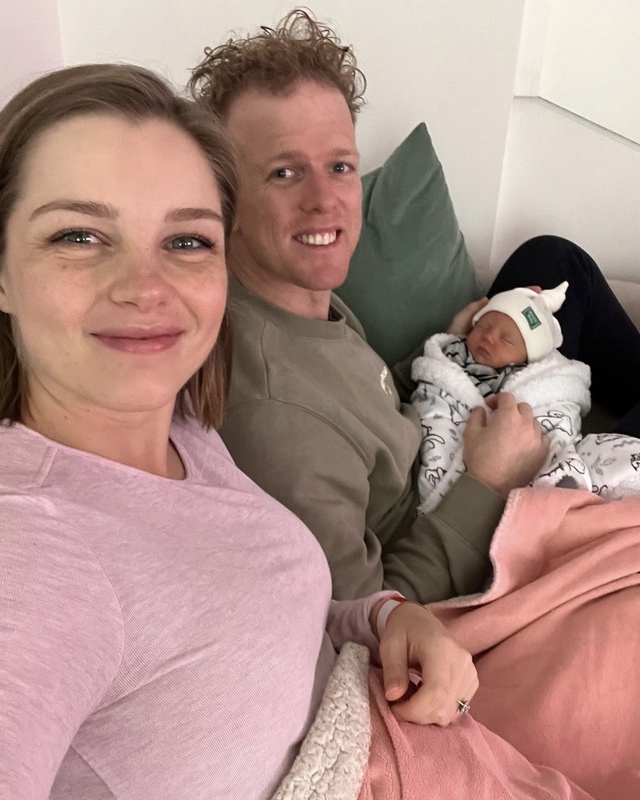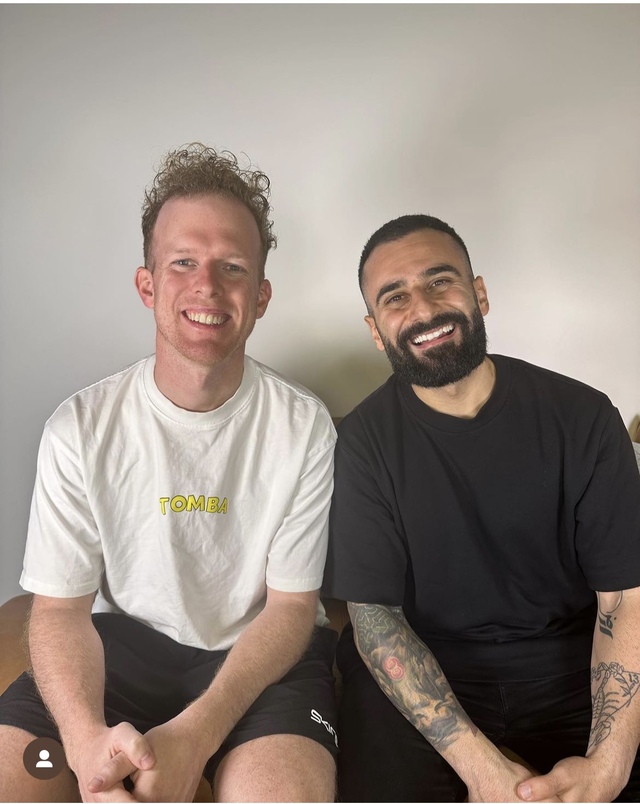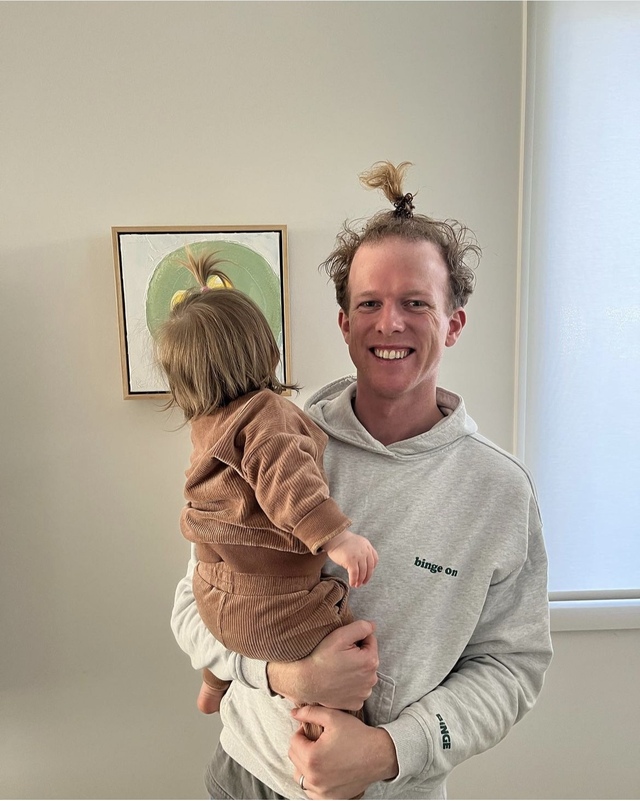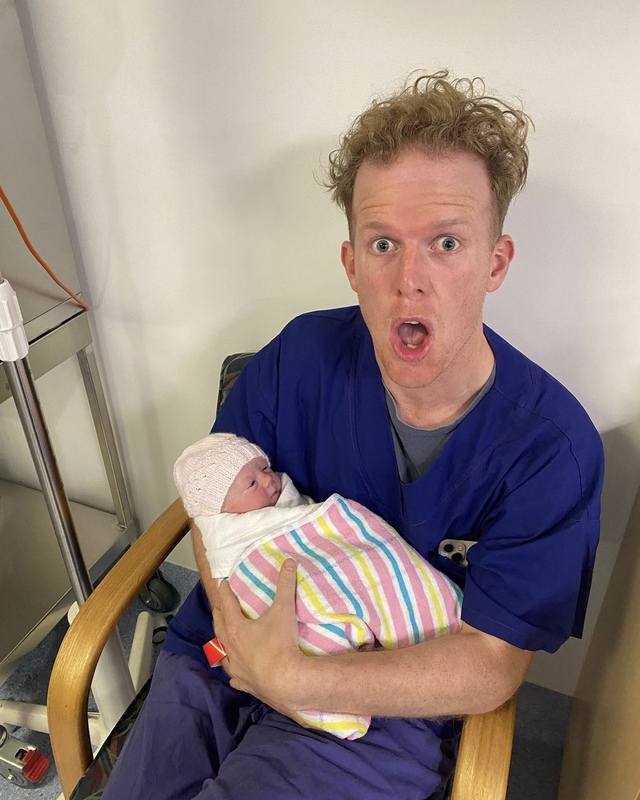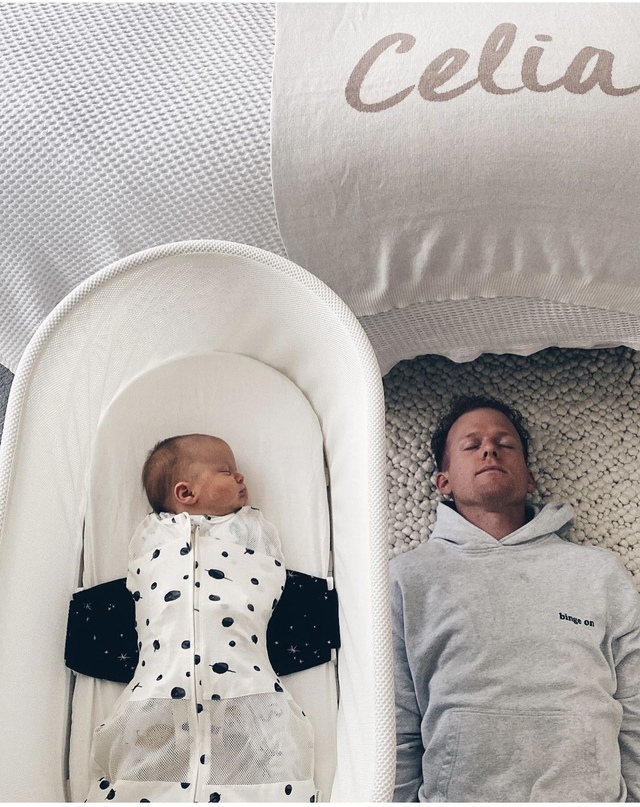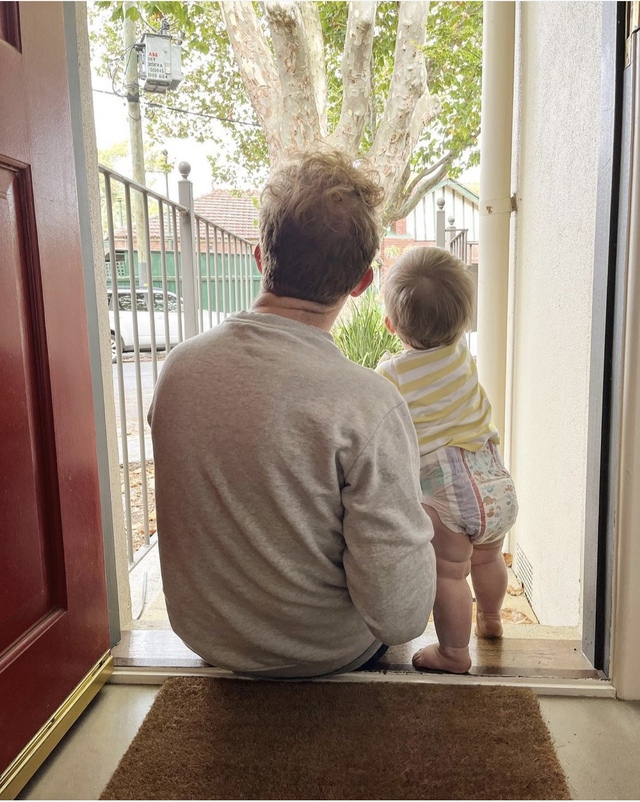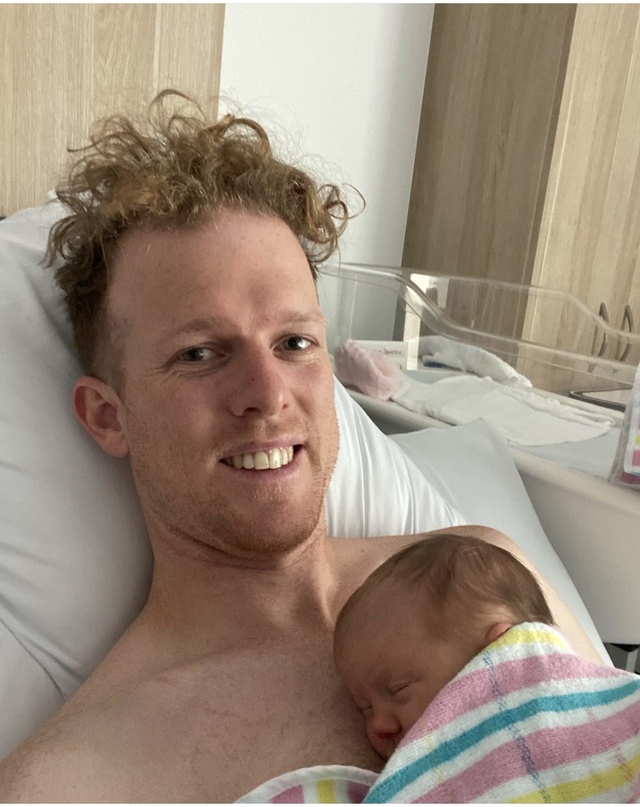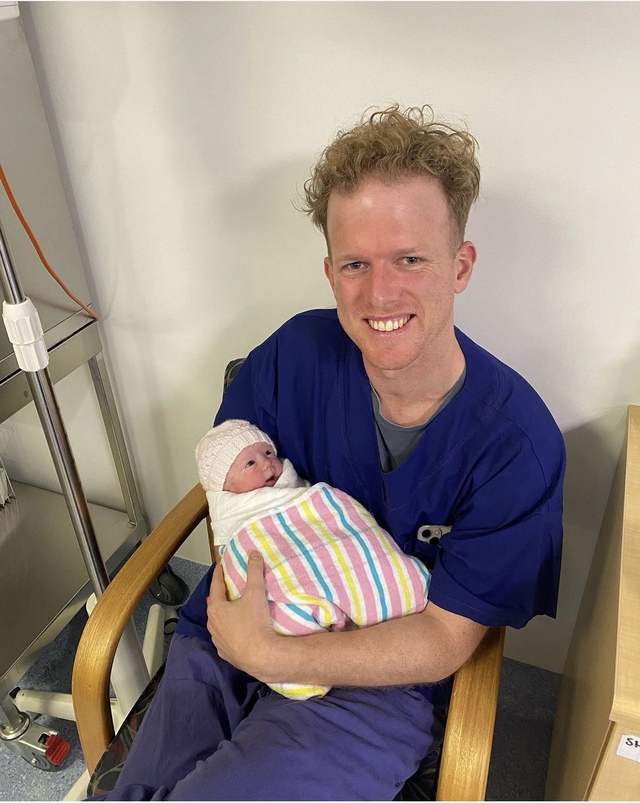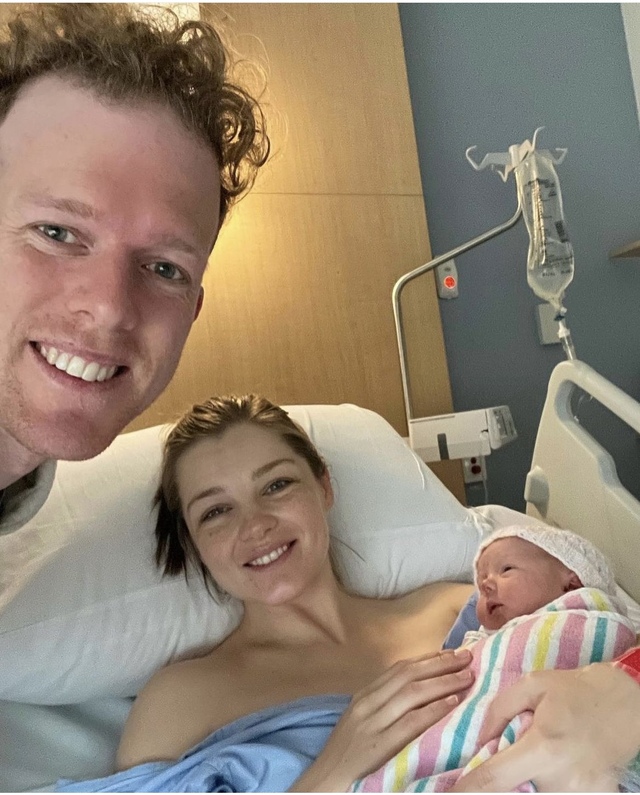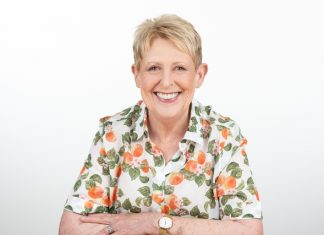By Casey Neill
Two professional couch potatoes are helping new dads to find their feet.
Gogglebox favourites Adam Densten and Matty Fahd are bringing their candid commentary to fatherhood in podcast The Dads and the Docs.
They’re sharing practical tips and stories to help prepare new parents with help from medical professionals.
Matty has sons Malik, 4, and Lyon, 1, while Adam has a two-year-old daughter, Celia.
“She turned up earlier than expected,” he said.
“The Denstons are known as being very punctual people.
“(My wife) Rach started mat leave on a Monday. On the drive home, she called me and said ‘she’s not really moving as much as she previously had’.”
Rach went in for a checkup and was surprised to discover she was in the very early stages of labour at 36 weeks.
Celia was in a breech position – bottom first rather than head down – so doctors didn’t want the labour to progress.
Rach called Adam to the hospital, and Celia was born 45 minutes after he arrived.
“The other four weeks would have been nice,” he laughed.
“She’s awesome.
“From day one she’s been a really good sleeper.
“She was sleeping through the night from seven or eight weeks.
“She’s super happy.
“She’s in her Bluey era at the moment.
“I intentionally didn’t watch any of it before she was ready so I could enjoy it with her.”
Celia changed Adam and Rach’s lives in ways he expected, and in many ways he didn’t.
“The big one was how our relationship changed,” he said.
He and Rach had been together six years when Celia arrived.
“You have six years of basically only focusing on each other to something else coming in and taking more than half of your focus,” Adam said.
“I’m really glad that Rach and I did heaps of travel in our twenties and saw lots of things and achieved some of the goals we had.
“I’m glad that we got all that out of the way.
“I can’t imagine what it would be like to be 22 and have a kid.
“I’m glad we waited a little bit longer. It made us the people we are.
“You can be ready to have a child but you can never be prepared to have a child.
“It’s going to be the most difficult thing you do but it’s not insurmountable, which it can feel like at times.”
That’s where the podcast came in.
“The thing that we found was the resources out there for dads are all for dads of teenagers or kids at school,” Adam said.
“We wanted to produce something that was digestible and easy and simple but also evidence-based.
“This is not an anecdote or some story that’s been passed down.
“And Dads don’t want a lecture, they just want the information.”
Adam and Matty wanted to highlight the support available, from sleep and lactation consultants to the maternal and child health and PANDA hotlines.
“Just knowing that those resources are out there can make a difference,” Adam said.
He said the stereotype was Mum doing all the research and passing on what she’d learnt to Dad.
“We’ve found that dads want to be more engaged and have the answers themselves.
“The big bumbling idiot dad is a bit of a dumb stereotype.
“If you want to learn how to swim you’ve got to get out of the boat.
“If you want to be good at changing a nappy, you’ll be shit at changing a nappy for a while but you’ve got to get into it and try.
“The more you are engaged, the better you’ll be.
“The more informed you are, the better time you’ll have.”
Adam wants to make parents – but particularly dads – feel less alone.
“Whatever you’re thinking has been thought before,” he said.
“A whole heap of research out there says the more hands-on a dad is, particularly early on in a child’s life, the more coordinated a child will be and the more resilient they’ll be.
“You want to produce a better version of yourself.”
Season one covers pregnancy, labour, the hospital stay, and the first week, month, and three months at home.
The first episode on each topic features a chat with an expert, and in the second, Adam and Matty chat about their takeaways and personal experiences.
“We wanted people who were really well regarded and spoke really well, and were still involved in some level of research so they were up with modern science and birthing,” Adam said.
Dr Scott Shemer covers everything dads can do to help their partner during pregnancy, while Dr Jonathan Nettle talks listeners through labour.
Paediatrician and neonatal doctor Dr Brendan Chan shares what to expect when you’re in the hospital room with your new family.
Dr Golly guides dads through the intimidating first week at home, Dr Cheng talks through what is and isn’t normal during the first month, and Dr Billy Garvey covers the mental health side of parenting.
Adam said the data showed an equal split of men and women listened to the podcast, “even though it’s a show by dads to get dads more engaged”.
Adam and Matty are planning for season two to feature targeted episodes, like a sleep-focused chat featuring a sleep consultant.
“We’re working it out and open to feedback,” he said.
What’s one thing Adam wishes he knew before having a baby? A tool to help prevent those day-destroying nappy blowouts.
“Nappies with the wings – I just was not told that you need to pull those out,” he said.
“I was only pulling out the frilly bits.”
His favourite nugget of wisdom delivered in the podcast’s first season counters the ‘love at first sight’ narrative often espoused by new parents.
“Billy Garvey has a great line: when you first saw your partner, did you fall instantly in love with them?” he said.
“It’s OK to let the relationship develop.”
As a bloke aged in his thirties, many of Adam’s mates are also having children and turn to him for advice.
“I just say ‘listen to my podcast’ and they say ‘I can’t be bothered’ and I say ‘fair enough’,” he laughed.
“People are afraid to tell you that some of it’s going to be a bit s*** because they don’t want to rain on your parade.
“I like the shit sandwich method.”
He tells them something really great, delivers something to look out for, and then rounds out the chat with another positive.
“The most helpful thing I think is just saying ‘reach out to me if you’re struggling’ and also reaching out to them during those first weeks,” Adam said.
“Say ‘I don’t expect you to reply to this, but if you need 20 minutes, I’m on the other end of the phone’ or ‘I’m coming over to drop food off’.”


